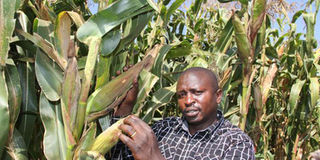More should be done to assist small farmers

A maize farmer displays his maize crops in Uasin Gishu County. PHOTO | JARED NYATAYA | NATION MEDIA GROUP
What you need to know:
- The ministry made a policy in 2008 to implement a demand-driven approach to extension. In this approach, the authorities would listen to and involve farmers fully.
- Agricultural extension has not been given the prominence it deserves particularly among the county chiefs who are more interested in visible infrastructural projects that demonstrate their development capabilities to the electorate.
- The markets have also shown preference for unprocessed products like milk, which works against value addition.
- We need long term investment in building trust in institutions and value chains based on fairness in sharing benefits and power relations.
Following devolution of agriculture to the county level, it was the dream of many farmers that service delivery would improve.
However, over the last three years, small-scale farmers still face constant challenges in food production and low income to meet other family needs such as health, education, clothing, housing and entertainment.
Soils have become infertile and overused. The problem is worsened by the erratic patterns of rainfall, which makes fertiliser use risky and expensive.
The government has also continued with business as usual. Agricultural extension has not been given the prominence it deserves particularly among the county chiefs who are more interested in visible infrastructural projects that demonstrate their development capabilities to the electorate.
This was the undertone from experts discussing the challenges of transforming smallholder agriculture during a recent conference organised by Tegemeo Institute of Agricultural Policy and Development of Egerton University.
The experts expressed concern that belief at the national level is that the devolved extension was equal to the task of delivering technology to farmers and organising them into groups. The evidence on the ground is contrary to this view.
The ministry made a policy in 2008 to implement a demand-driven approach to extension. In this approach, the authorities would listen to and involve farmers fully.
However, many years down the line, the ministry officials still sit in the office to wait for farmers to seek the services of extension workers.
Policy makers have continued with the same stance even though they believe in commercialising agriculture.
HIGH RETURNS IS THE MAGICAL KEY
The ministry’s well-meant mobilisation of farmers into groups for easier access of extension services and aggregating commodities for marketing has not borne any fruits.
The low levels of accountability and trust among Kenyans make it difficult to build group cohesion that would give them a bargaining advantage in the markets.
Most farmers want to operate as individuals and tend to engage in negative competition in the local markets.
This has allowed middlemen to take advantage of them, reducing the return on investment which makes commercialisation a pipe dream.
There was consensus in the conference, however, that smallholder farmers should be viewed as an important part of the value chain and supported by all players.
However, the old argument on value addition, borrowed from coffee and tea, may not work for staples which are grown by majority of smallholder farmers and have thin markets and low value.
The markets have also shown preference for unprocessed products like milk, which works against value addition.
High returns to small-scale enterprises in farming is the magical key to transforming smallholder farming.
If you cannot buy a car, tractor or a house from farming then there is little attraction for people will invest their money into it.
We need long term investment in building trust in institutions and value chains based on fairness in sharing benefits and power relations.
Accountability, real time coordination and inclusiveness, trust and competitive service delivery in both public and private sectors will make this possible.
Mr Oduori is an Assistant Research Fellow at the Tegemeo Institute of Agricultural Policy and Development, Egerton University.




